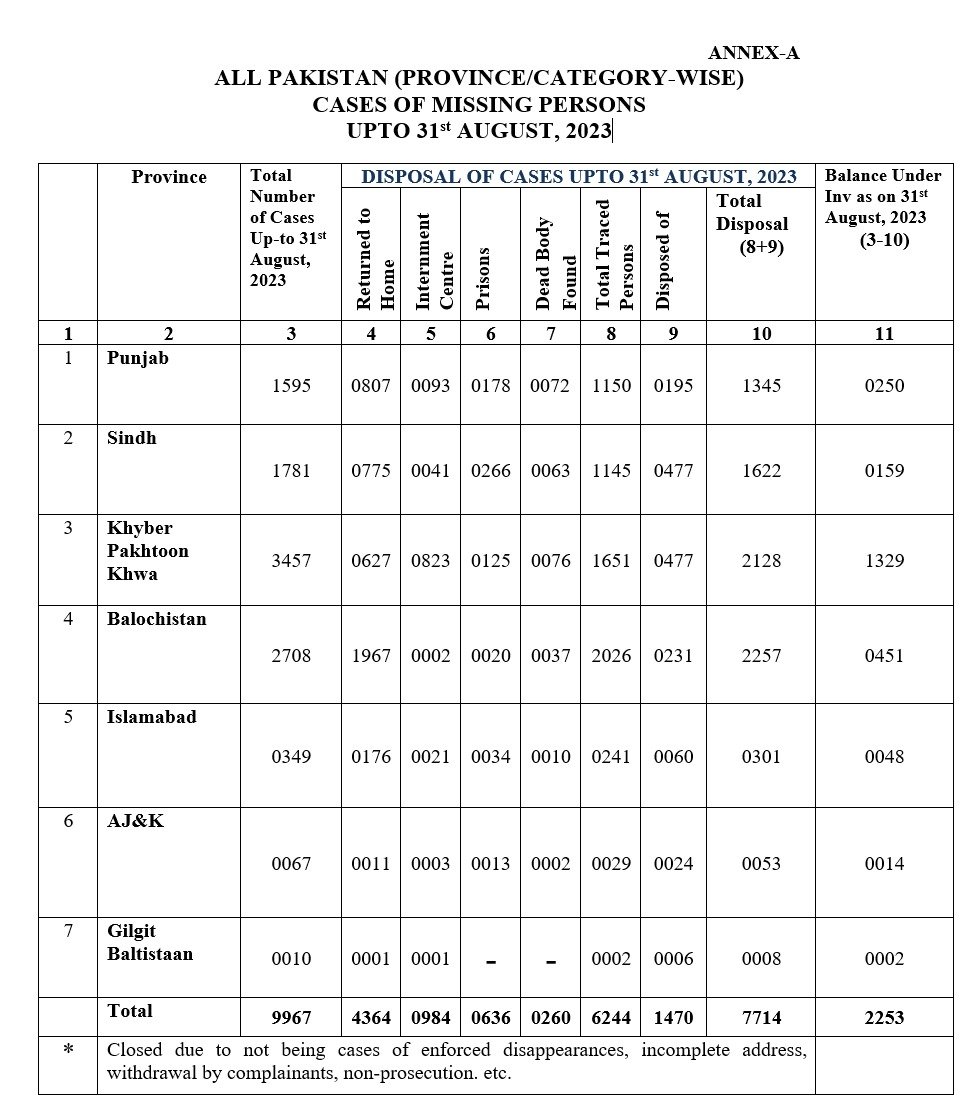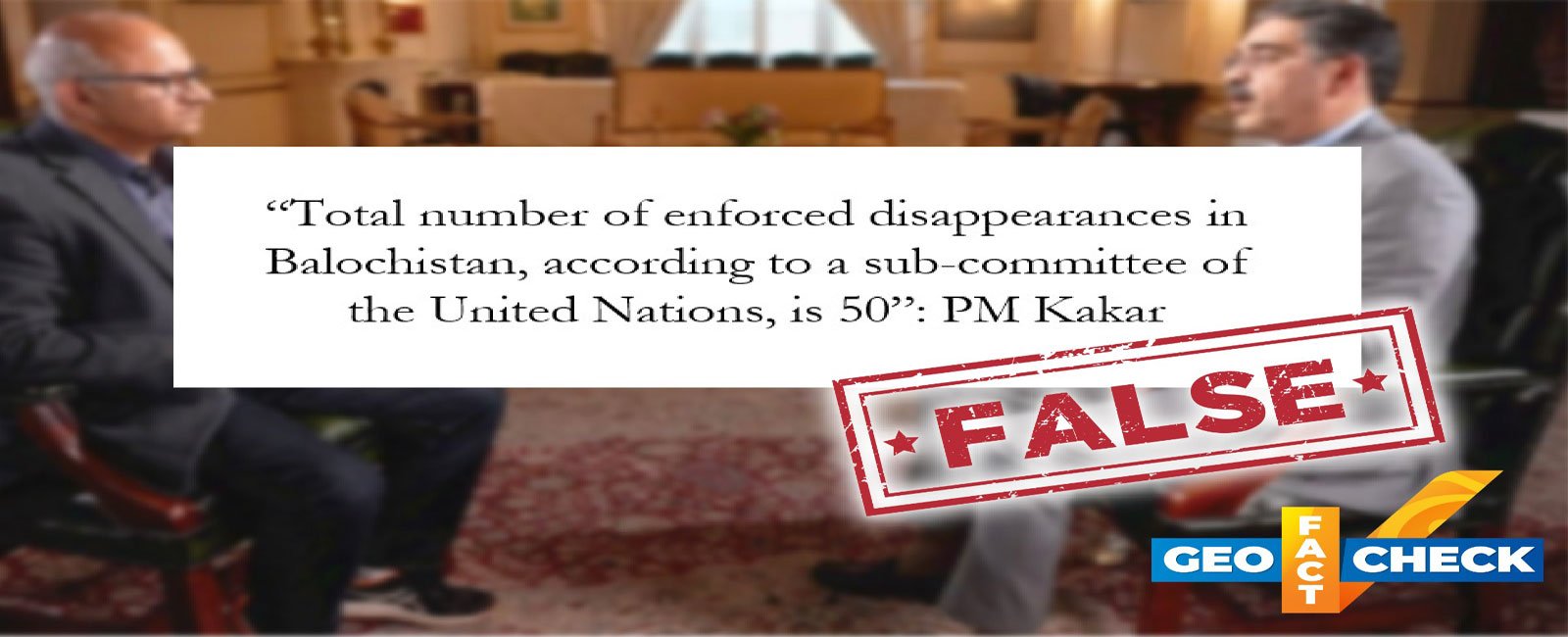Fact-check: Interim PM makes false claim about enforced disappearances in Balochistan
The United Nations publicly available reports and the government’s own data contradict the prime minister’s claim

Pakistan’s interim Prime Minister Anwaar-ul-Haq Kakar has alleged that as per the United Nations only 50 cases of enforced disappearances have been reported from the Balochistan province.
The claim is incorrect.
Claim
In an interview to BBC Urdu on September 29, the caretaker prime minister said that as per the data of the United Nations’ (UN) sub-committee on enforced disappearances there are an estimated 50 disappeared citizens in Pakistan’s Balochistan province.
“Enforced disappearances in Balochistan, according to a sub-committee of the United Nations, are around 50 [people], while in Indian-occupied Kashmir the number is around 8,000,” he alleged, when asked about missing persons in the country.
Kakar later added that the United Nations has set criteria to determine if a complaint qualifies as an enforced disappearance or not.
“Hence, [high figures of victims of enforced disappearances] can be used as a propaganda tool against state institutions,” he said.
The video has been viewed over 17,000 times to date, and the interview has been reported by all mainstream news outlets in the country.
Fact
The United Nations publicly available reports and the government’s own data belie the prime minister’s claim.
The UN’s sub-committee, the caretaker prime minister is referring to, is called the Committee on Enforced Disappearances (CED), which is a body of independent experts who monitor the implementation of the Convention for the Protection of all Persons against Enforced Disappearance by states.
According to the Convention, adopted by the General Assembly in 2006, an enforced disappearance is defined as an “arrest, detention, abduction or any other form of deprivation of liberty by agents of the state or by persons or groups of persons acting with the authorization, support or acquiescence of the state, followed by a refusal to acknowledge the deprivation of liberty or by concealment of the fate or whereabouts of the disappeared person, which places such a person outside the protection of the law.”
Geo Fact Check could not find any report on the CED’s website that states that there are only 50 victims of enforced disappearances in Balochistan.
The most recent report on its website examines cases between May 13, 2022, and May 12, 2023. The report notes that the UN body transmitted 1,635 complaints of enforced disappearances to the government of Pakistan in that period alone.
An earlier report by the UN’s Working Group on Enforced or Involuntary Disappearances (WGEID), published in 2016, after a visit to Pakistan, specifically mentions Balochistan and states that sources in the province alleged more than 14,000 people are still missing, but the provincial government recognizes less than 100 people.
The report adds that it is difficult to ascertain the exact number of such cases, due to the discrepancy between the data provided by the government and the number raised by human rights organizations, however, this “should be interpreted as an indication of the government’s lack of cooperation and political will to investigate cases of enforced disappearance”.
Meanwhile, Pakistan’s own Commission of Inquiry on Enforced Disappearances records 2,708 cases from Balochistan till August 31, 2023, as per the data shared with Geo Fact Check.
Of which, the Commission claims to have disposed of 2,257 cases to date, due to some victims returning home, others being located at internment centers or prisons, etc. Even this has left 451 cases pending in the province, and not 50 cases as alleged by the prime minister.

As per the official tally, the Commission has recorded 9,967 cases of missing persons across Pakistan till August 31, of which 2,253 are still pending.
Farid Ahmed Khan, the secretary of Pakistan’s Commission of Inquiry of Enforced Disappearances, told Geo Fact Check over the phone that the UN’s definition of enforced disappearances was “more or less” the same as that being used by the Commission.
Khan further added that the UN’s Working Group sends the Commission a quarterly report of cases of enforced disappearances in Pakistan. He, however, was hesitant to call the prime minister’s claim incorrect, adding that the number of pending cases keeps changing every day.
He also refused to share the number of complaints the UN has reported to the Commission.
Separately, a recent member of the Commission, who asked not to be identified due to the sensitivity of the matter, also said the prime minister’s statement did not seem accurate and the number of pending cases in Balochistan right now was “likely over 400 or so”.
Geo Fact Check then spoke to Umer Ijaz Gilani, an advocate of the Supreme Court in Pakistan, who also rubbished the prime minister’s claims, adding that the cases in Balochistan must be in hundreds, and not 50.
With additional reporting by Muhammad Binyameen Iqbal.
Follow us on @GeoFactCheck. If our readers detect any errors, we encourage them to contact us at [email protected]




